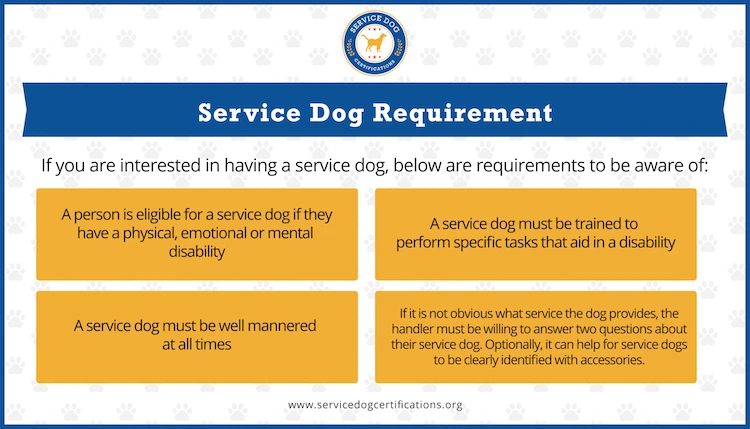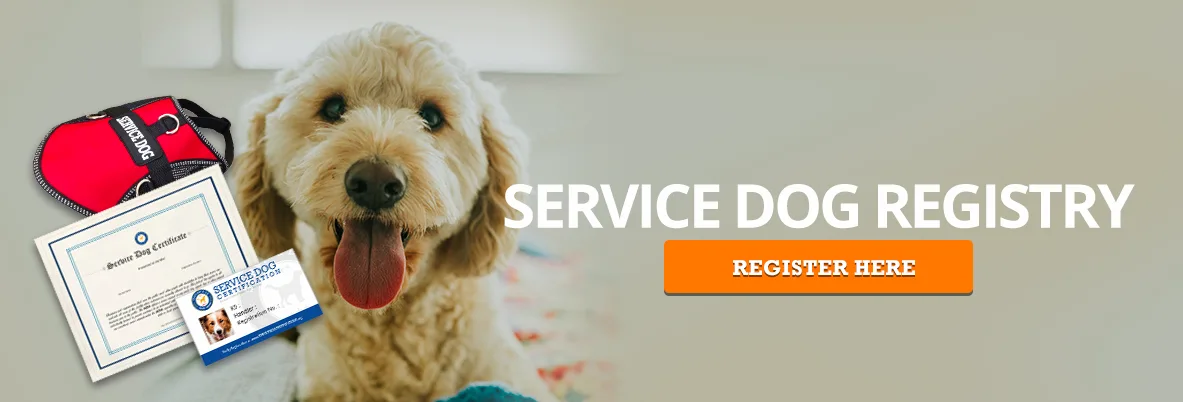How to Register a Dog as a Service Dog in Pennsylvania

Service dogs act as essential aides for many people facing physical or psychological disabilities. Recognizing their vital assistance, Pennsylvania has set forth laws that protect the rights of service dog handlers.
In the Keystone State, service dogs are granted full access to public areas where other animals might typically be restricted. Additionally, these dogs are permitted in residential buildings where pets aren’t usually allowed (without having to pay pet charges).
This guide will discuss the rights of service dogs in Pennsylvania, the qualifications necessary for their handlers, and whether a registration process is required.
Who’s eligible to handle a service dog in Pennsylvania?
Service dogs are more than pets; they’re legally designated assistance animals tasked with aiding individuals with disabilities. The Americans with Disabilities Act (ADA) categorizes a person with a disability as someone:
“who has a physical or mental impairment that substantially limits one or more major life activities.”
Eligibility in Pennsylvania requires that the handler must have a verifiable physical or mental health disability. The service dog, trained either by the handler or a professional, must be capable of performing tasks specific to the handler’s needs.
These dogs can perform a myriad of tasks, such as guiding individuals who are visually impaired, providing comfort and assistance for those with psychiatric issues, or assisting with physical mobility, among others. Those that cater specifically to mental health are often referred to as psychiatric service dogs.

Navigating Service Dog Registration in Pennsylvania
Is registration compulsory? There is actually no legal requirement in Pennsylvania to formally register service dogs. While you don’t need to provide registration documentation to validate your service dog’s status, many handlers choose to register voluntarily to obtain an ID card.
Handlers frequently use indicators such as vests, ID cards, and certificates to signal their dog’s special status. These symbols help differentiate a standard pet from a trained service dog, potentially reducing confrontations in places where pets aren’t typically permitted and ensuring the dog’s role is respected.
It’s vital to remember that these items are not official proof of a service dog’s legitimacy. Their presentation should not be a condition of access. They’re primarily for the handler’s convenience.
In Pennsylvania, when a service dog’s role isn’t immediately evident, individuals may ask only two specific questions:
- Is the dog a service animal required because of a disability?
- What work or task has the dog been trained to perform?
After answering these two questions satisfactorily, a service dog handler in Pennsylvania should be granted access to public spaces without any further documentation.
For handlers interested in registering their service dog and obtaining an ID card, platforms like Service Dog Certifications (SDC) are commonly used. The process for registering a service dog with SDC in Pennsylvania includes:
- Confirm your status as a service dog handler.
- Provide details about the service dog and handler.
- Submit an email address for communication and receipt of a digital ID.
- Upload a current photograph of your service dog.
- Select additional items, such as extra ID cards, collar tags, or vests, if desired.
Essential Training for Service Dogs in Pennsylvania
A dog must undergo rigorous training specific to the handler’s needs to be considered a service dog. Additionally, they should demonstrate excellent behavior and control in public settings.
Common training methods include:
- Acquire a dog that has already been trained.
- Hire a professional to provide specialized training.
- Self-train your dog, which can deepen the bond between handler and animal. This should only be undertaken if you’re thoroughly familiar with the necessary training techniques.
Service Dog Laws and Regulations in Pennsylvania
Alongside the federal ADA regulations, Pennsylvania enforces its own laws to reinforce the rights of service dog handlers. In Pennsylvania, consistent with ADA guidelines, individuals with disabilities are permitted to bring their service animals into all public facilities.
There are several laws in Pennsylvania that protect service dog owners. For example, the Pennsylvania Human Relations Act (PHRA) governs state and local government activities and many privately owned public accommodations within Pennsylvania. In addition, there are many local laws in cities like Philadelphia and Pittsburgh that further protect disability rights when it comes to service dog access.
It’s also crucial to understand that under the Pennsylvania Criminal Code, it is a summary offense for proprietors, managers, or employees of public accommodations to deny access to disabled individuals with service dogs.
There can be severe legal consequences for violating the rights of a service dog handler. In one case, a $100,000 settlement was reached when a 16-year-old special needs student was denied accommodation for her service dog. The psychiatric service dog was trained to detect rising cortisol levels on her breath, which indicate stress and anxiety, and alert those around her of an oncoming panic attack or seizure.
Conclusion
This guide aims to help Pennsylvania residents navigate the world of service dogs, ensuring that both handlers and their dogs receive the respect and rights they’re due. Understanding and adhering to these guidelines will help foster a supportive environment for service dogs and their handlers across the state.
About the Author: The writing team at Service Dog Certifications is made up of folks who really know their stuff when it comes to disability laws and assistance animals. Many of our writers and editors have service dogs themselves and share insights from their own experiences. All of us have a passion for disability rights and animals.
Related Articles

Hipster Dogs: Trendy Pups, Beards, and Beanies
From PBRs to beanie caps, and from plastic sunglasses to “pawsome” music, hipster dogs have taken the world by storm — and there’s no turning back. Because, let’s face it, these little guys and gals were rocking the style before it was cool — not that they would care what’s cool, though. For a “pawsitevly” […]

Read More

How Dogs Can Calm Anxiety
A person suffering from anxiety attacks experience many risks, and it’s one of the reasons why it’s prudent to consider having a service dog or emotional support animal as a companion. The animal can keep the environment safer for the individual and below are some of the ways a dogs can calm anxiety: 1) Dogs […]

Read More

Can Cats Be Service Animals?
Having a cat brings the same positive effects as dogs. These pets can be equally beneficial to a person’s health. Experts have proven that cat owners are less likely to have a health emergency, such as a heart attack, with their feline companion around and cats have also been proven to help alleviate sleeping disorders, […]

Read More



My name is Carmen, but I am writing to find out for my husband he’s a 30 yr Disabled Retired Army Veteran and we just got a 8 month miniature yorkie, so does he make her a Service Dog or ESA
Whether a dog is a service dog or ESA primarily depends on whether it has undergone individualized training to help the owner deal with a disability. If the dog helps the owner feel better mentally and emotionally just by being present, it is more likely an emotional support animal. However, if the dog has been trained to perform a job or task that directly assists the handler’s disability, it could be a service dog.
How do you make your dog an emotional support dog- not a service dog!! My dog helps my anxiety when i am feeling blue-I do not take medicine, so my dog is my medicine. It’s like having a nurse with you 24 hours of the day-= without the exorbitant cost!! Looking forward to a response on my question.
To get an emotional support animal you will need an ESA letter from a licensed healthcare professional. Please see this link for more details: https://www.servicedogcertifications.org/esa-letter/
My boyfriend has a job working as a personal trainer for multiple adults with special needs. We have two dogs that were trained to be service dogs but are not certified. Can they be certified for working with the clients who have special needs eventhough we (the owners) do not?
You don’t need to certify a service dog in order for it to be considered an ADA service dog. The relevant criteria is whether the dog has accomplished the training needed to assist someone with a disability. If the handler wants to obtain a certificate for convenience, they can do so through our site.